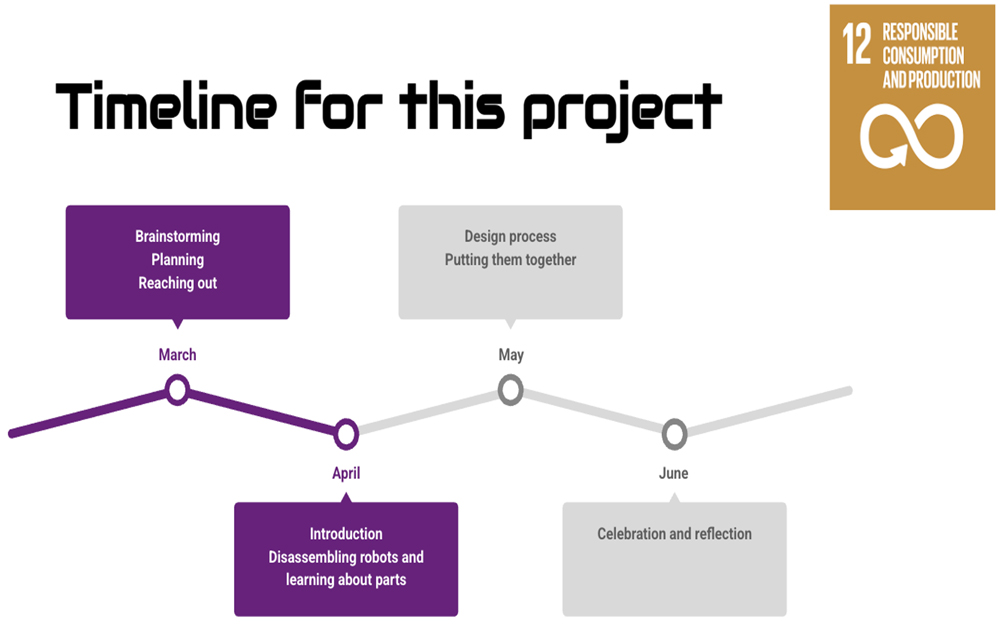
At UNIS Hanoi, our commitment to the United Nations Sustainable Development Goals (SDGs), our mission statement and sustainability values shape every aspect of our curriculum, even for our youngest learners. In the Early Years program, we strive to foster transdisciplinary learning, guided by the International Baccalaureate (IB) Primary Years Programme (PYP) Approaches to Learning (ATL) skills and units of inquiry through play-based learning. This year, we embraced a unique challenge: repurposing broken robot parts to create something new, meaningful, and sustainable.

(Photo source: UNIS Hanoi)
Technology Through Sustainability
Instead of discarding broken robots, students engaged in a ten-week journey of inquiry, design, and hands-on creation. By dismantling old robots and reimagining their parts, children learned to see value in what is often considered waste, which was directly aligned with SDG 12 (Responsible Consumption and Production) and our school’s sustainability commitments. This project gave technology a new dimension beyond typical screen time, promoting responsible use and creative problem-solving, which is age and developmentally appropriate for our students who are 4 and 5 years old. (Photo source: UNIS Hanoi)
(Photo source: UNIS Hanoi)
“We have to recycle and repurpose so that we don’t make more trash!” Till, Age 5
“Our Planet Earth is dying because there’s too much trash because we use too many things.” Leo, Age 5
Agency, Collaboration, and Skill Building
Throughout this process, students exercised agency by brainstorming, planning, and making design decisions. Teachers acted as facilitators and role models, guiding students through each step but enabling them to take risks and try new skills. This approach nurtured confidence, resilience, and a growth mindset, which are key to the PYP ATL skills, including thinking, communication, and self-management.
By working in small groups, students practiced cooperation, negotiation, and reflection. They documented their ideas on paper, discussed solutions with peers, and reflected on their learning through interviews and group debriefs. There were some challenges that added to the development of skills. Time was one of them, but we were able to continue as we followed the students’ interests and level of engagement. There were times of spontaneity which sparked even better ideas such as deciding on how we should assemble the new designs. Everyone took part in the decision-making process as we value equity and inclusion. This collaborative inquiry fostered both social and cognitive development, but most importantly, fun!
 (Photo source: UNIS Hanoi)
(Photo source: UNIS Hanoi) “We need to recycle because there’s too much trash and it’s bad!” Rina, Age5
“Don’t buy plastic because the fish and sharks eat them and they die.” Elie, Age 5
Real-World Connections
Repurposing robot parts not only reduced waste but also allowed students to see themselves as contributors to real-world solutions. They used proper tools safely, developed creative and analytical thinking, and experienced technology as makers, not just consumers. This resulted in the creation of a “deconstructed robot” which tells a story of sustainability, innovation, and hope for the future. The students were really motivated to share their care and concern for the environment, especially as they wondered why there is so much waste accumulated over time, which they were able to observe first-hand at our school’s recycling center.

“Why don’t we buy less toys because it’s not good for animals and trees.” Yiman, Age 5
“Who cleans our trash? Where do our trash go?” Alice, Age 4
“Why do some people burn trash outside? The smoke is black and bad for us.” Vy, Age 5
As technology rapidly evolves, it is crucial for our youngest learners to build foundational skills that support lifelong learning. Through this project, students explored technology holistically, developing curiosity, adaptability, and an understanding of how the world works. They became risk-takers, unafraid to tackle unknown tasks and prepared to thrive in a world shaped by Artificial Intelligence (AI) and constant change.

Key Takeaway“We are helping Planet Earth to live because we are using less trash!” Filippos, Age 5
“If we don’t reduce trash, then Planet Earth will be swamped. The bees can’t get honey and we won’t hear the beautiful noises from the birds.” Oscar, Age 5
This project exemplifies how technology, sustainability, and the IB PYP framework can be woven together in the early years to nurture capable, creative, and caring learners. By embedding these values and skills from the start, we help students become agents of change so that they can be ready to protect our planet and shape the future.
Adika Cremet is an international educator for nearly 20 years who has taught and led in schools in New Zealand, Denmark, China, and is currently teaching and leads the Early Years team at UNIS Hanoi in Vietnam. She is an advocate for children's rights, play based learning, early education, and sustainability.
Neal Clark is finishing his sixth year at UNIS Hanoi as a Technology and Innovation coach. Collaborating with teachers to meaningfully and successfully integrate technology in their classrooms is a big part of that job, one that he is wholeheartedly committed to.